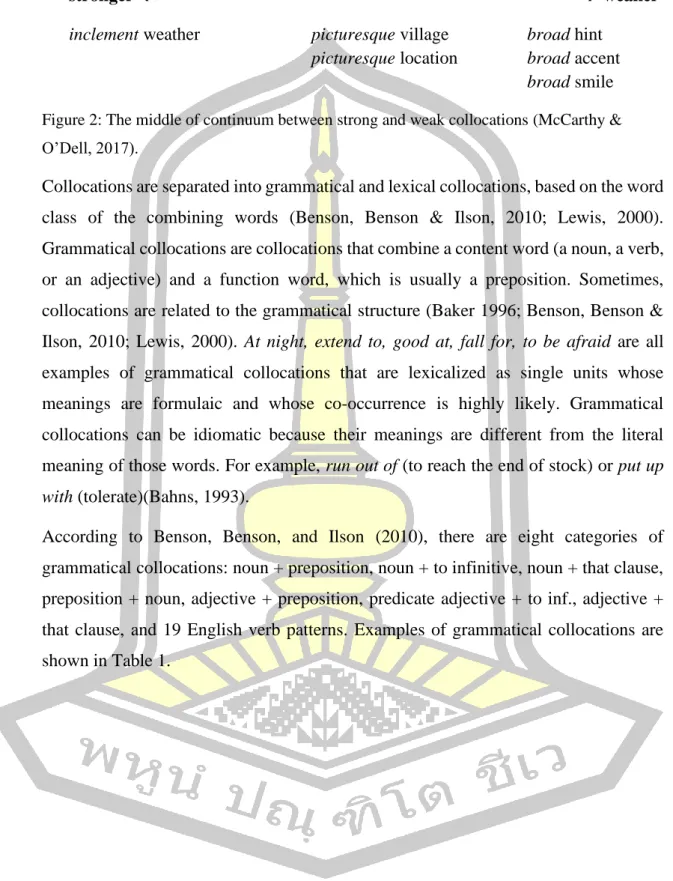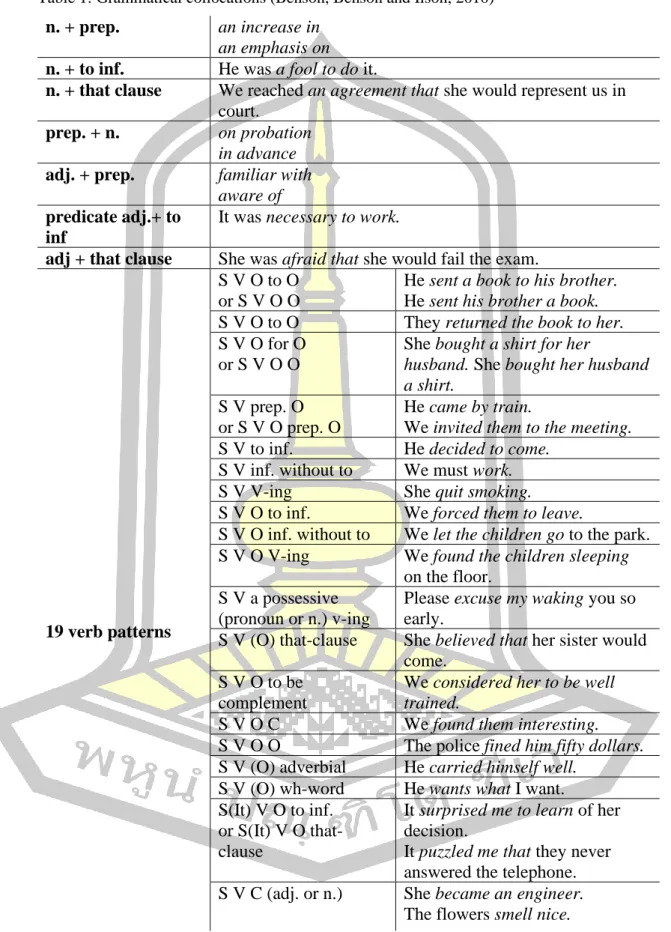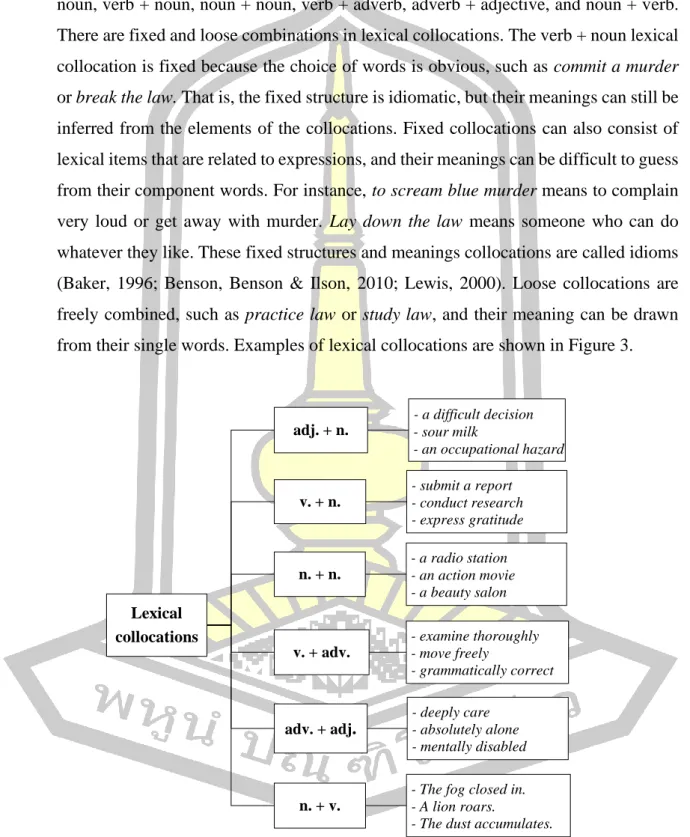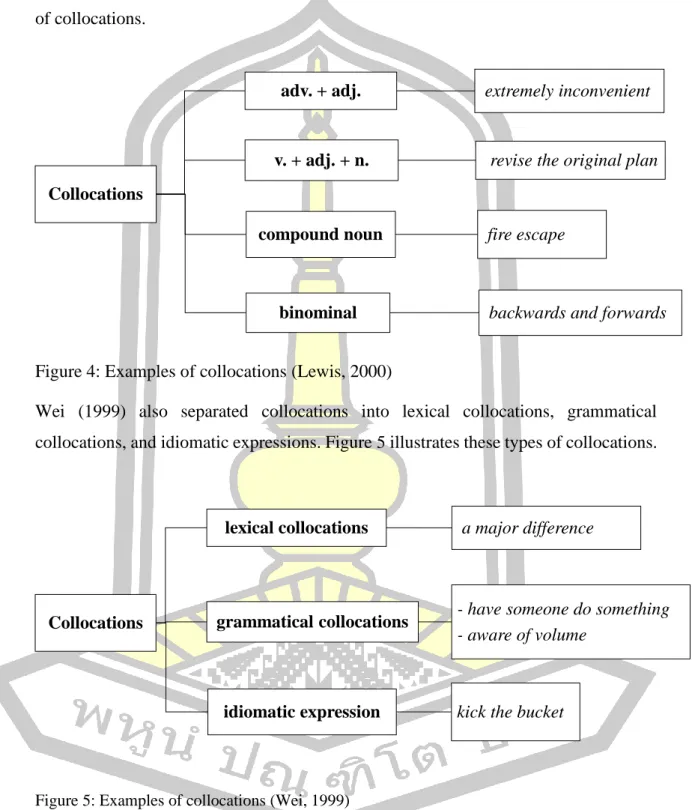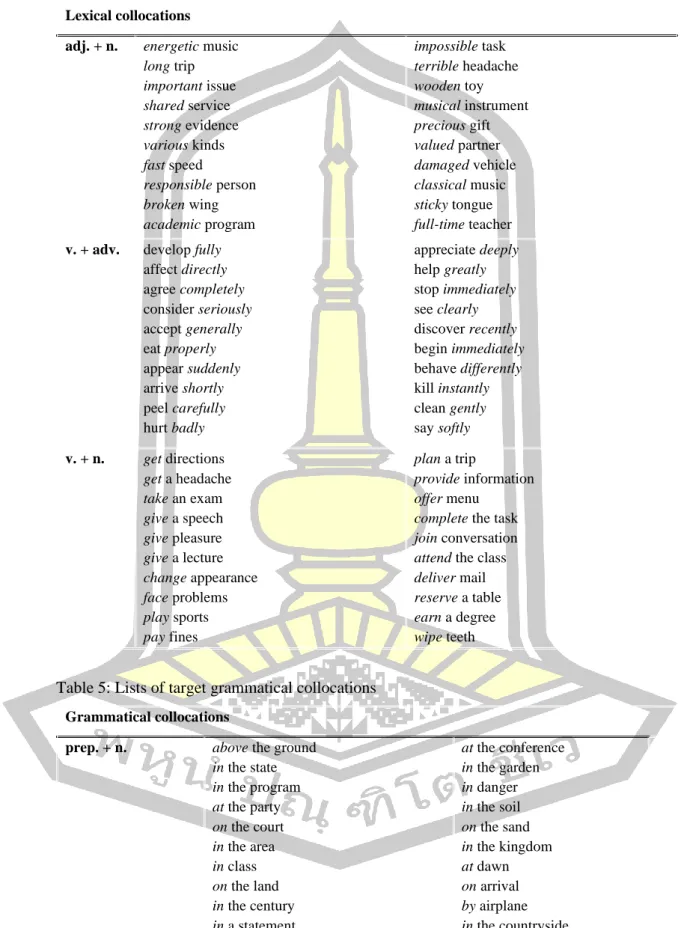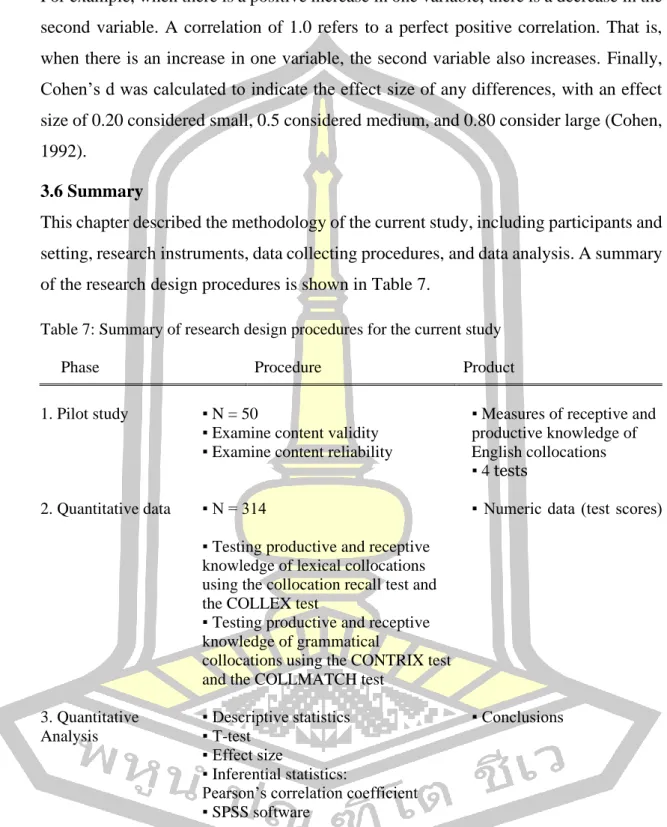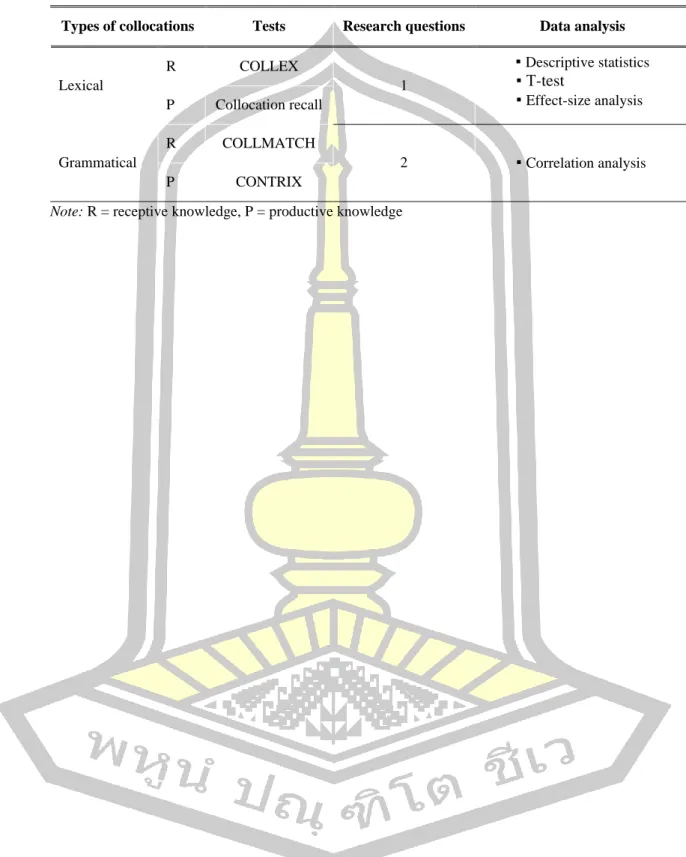My sincere appreciation also goes to the committees, Associate Professor Supakorn Phookaroensil, Ph.D., Pilanut Phusawisot Ph.D. and Nuchsara Choksuansup Thongsan Ph.D., for their feedback on my thesis. I must thank the experts who helped me provide feedback on research instruments, Associate Professor Supakorn Phookaroensil, Ph.D., Anuchit Toomaneejinda Ph.D., Pilanut Phusawisot Ph.D., Nuchsara Choksuansup Thongsan Ph.D., Peter James Hoffman , Robert Wright, Panadda Thiendathong and Parinyachat Vajarakhenhong.
INTRODUCTION
Background of the study
Thai high school students' lack of collocation knowledge may be the reason for this poor performance in the national English exam. As such, the current study will investigate the receptive and productive knowledge of grammatical collocations in Thai high school students.
Purpose of the study
Moreover, little effort has been made to examine collocation knowledge in EFL Thai contexts, especially in high school students. Understanding middle school students' common knowledge levels will provide a platform for pedagogical practices and vocabulary knowledge development.
Scope of the study
Significance of the study
Definitions of terms
Organizations of the study
Next, the review presents the constructions and roles of English collocations that they play in language learning. The chapter explains the method of selecting target collocations used in this study.
Constructions of collocations
These types of collocations are predictable because they cannot be replaced or changed by other words. Collocations are divided into grammatical and lexical collocations, based on the word class of the combining words (Benson, Benson & Ilson, 2010; Lewis, 2000).
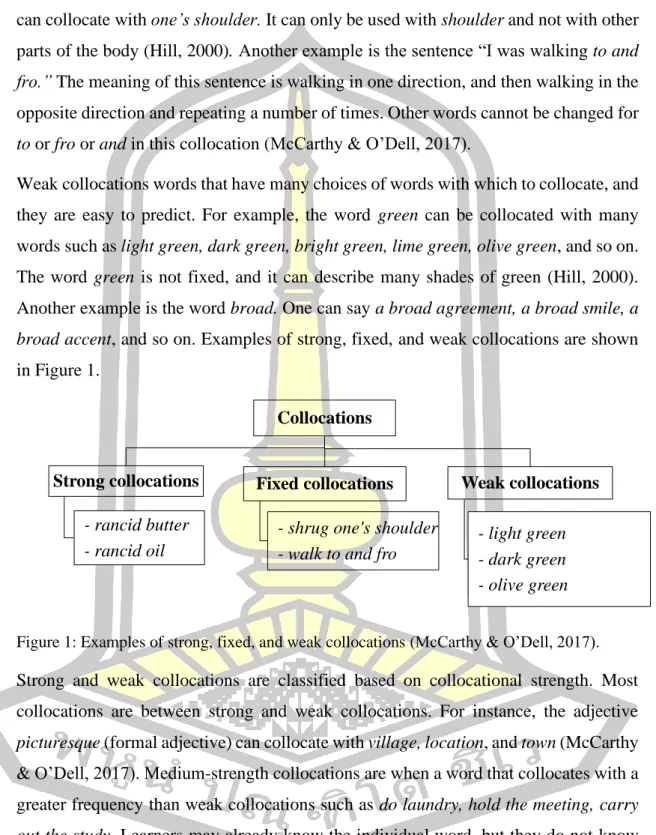
Roles of English collocations in language learning
The frequent occurrence of collocations is also an additional reason why it is imperative to learn collocations. Collocations are something new for teachers and often the teacher's knowledge about collocations is not sufficient.
Testing collocations
Test-takers are required to choose the correct combination of verbs, articles and nouns related to the given sentence. This type of test can be used to measure test-takers' productive knowledge because test-takers must produce meaning by combining lexical components.
Previous research on collocations
Nizonkiza, Dyk, and Louw (2013) studied second language learners' productive knowledge of collocations at the tertiary level. Boudribila, Azalmad, and Khadiri (2018) examined students' productive knowledge of adjective-noun combination among 464 Moroccan EFL students from seven universities in Morocco. This study was conducted to measure the productive and receptive knowledge of lexical collocations to know the collocational competence of the students.
In a Thai context, Bueraheng and Laohawiriyanon (2014) studied the relationship between exposure to English and students' knowledge of collocations. The results showed that students' productive knowledge of collocation is slightly higher than receptive knowledge. Suwitchanphan and Phoocharoensil (2014) studied knowledge of collocations, especially adjective + noun collocations, among regular EFL and English language learners.
Summary of the current study
Sridhanyarat (2018) studied the acquisition of second language collocations in Thai learners by investigating the difficulty of grammatical and lexical collocations for Thai EFL learners. Participants were divided into high- and low-ability groups, and students' collocational knowledge was assessed through receptive and productive tasks. The results showed that most target combinations were too difficult for both groups of students.
Difficulties with collocations may be related to the transfer of students' first language, the transfer of prior knowledge of congruent collocations, and the effects of receptive and productive tasks. We also measured receptive and productive knowledge of grammatical collocations with the developed COLLMATCH test (Gyllsatad, 2009) and the CONTRIX test (Revier, 2009). Specifically, lexical collocations included adjective + noun, verb + adverb, and verb + noun, while grammatical collocations included preposition + noun, noun + preposition, and verb patterns.
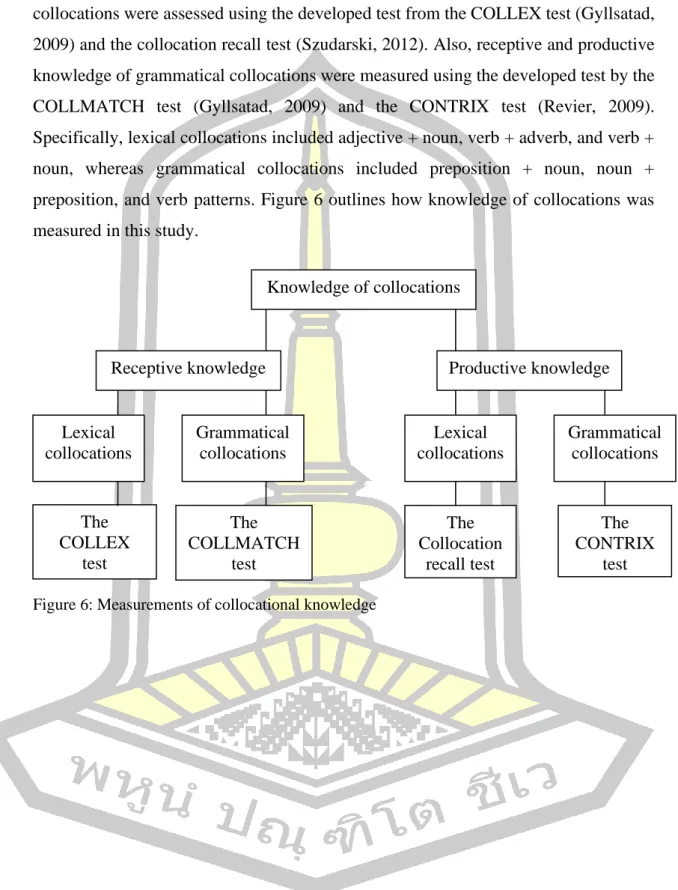
RESEARCH METHODS
- Participants and setting
- Research instruments
- The receptive tests of English collocations
- The productive tests of English collocations
- Selected target collocations
- Data collection procedure
- Data analysis
- Summary
This chapter presents the findings regarding EFL learners' receptive and productive knowledge of English collocations in Thai secondary schools. Receptive and productive tests of lexical and grammatical collocations were used to examine participants' knowledge of English collocations. Figure 7 shows a summary of Thai high school EFL students' knowledge of English collocations.
The results of the correlation analysis showed that receptive and productive knowledge of English collocations were moderately positively correlated. Moreover, there was a significant difference between receptive and productive knowledge of English collocations with a large effect size. The purpose of research question 1 was to investigate Thai high school students' receptive and productive knowledge of English collocations.
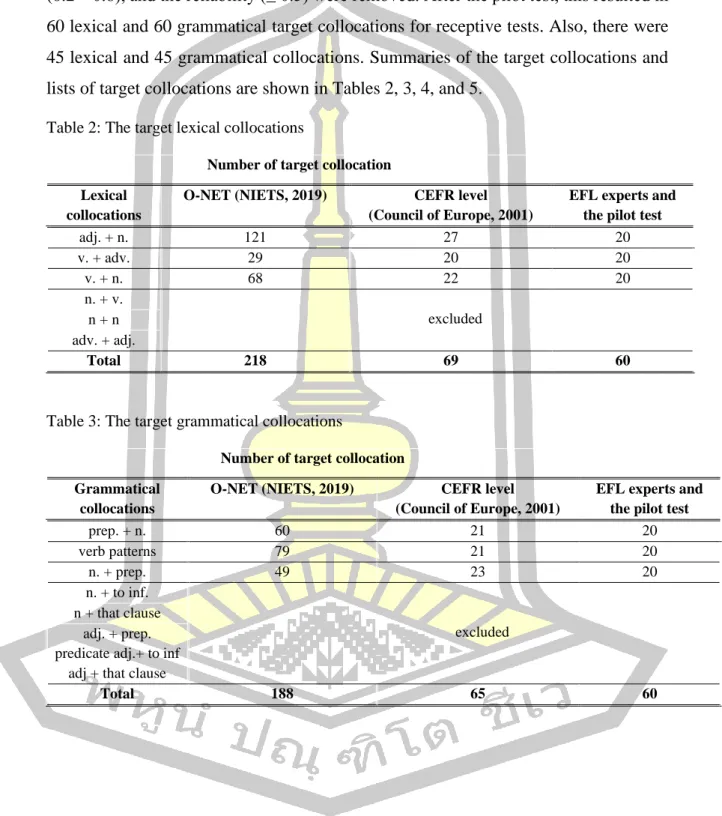
RESULTS
Receptive and productive knowledge of English collocations in Thai high
Specifically, COLLEX test performance (57.50%) was higher than Collocation recall test performance (49.75%) in knowledge of lexical collocations. Mean scores for receptive and productive knowledge of lexical collocations on the COLLEX and Collocation recall test performance were significantly different (t = 22.88, p < .05, Sig. 2-tailed = .000), with a large effect size (d = 1 ,44). Furthermore, there was a significant difference between receptive and productive knowledge of grammatical collocations on the COLLMATCH and CONTRIX tests (t = 40.02, p <.
A comparison between Thai high school EFL students' knowledge of lexical and grammatical collocations is presented in Table 11. Overall, the results showed that participants achieved a higher mean performance in receptive knowledge than productive knowledge of English collocations. This suggests that productive knowledge of English collocations is more difficult to acquire than receptive knowledge of English collocations.
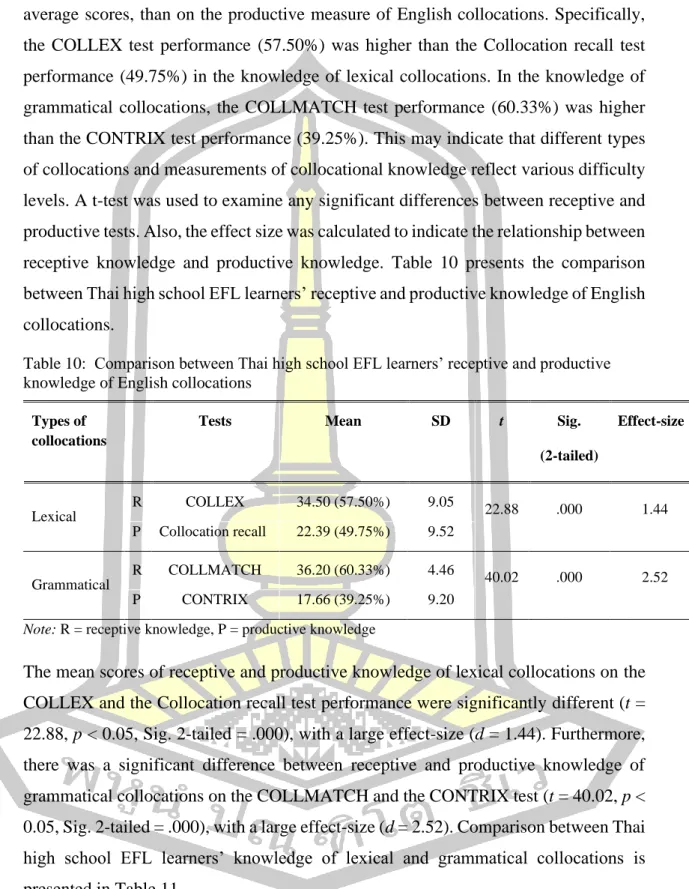
Relationship between receptive and productive knowledge of English
There was a moderate positive correlation between the COLLEX and the Collocation recall test, which measures respectively receptive and productive knowledge of lexical collocations (r . = .593). There was a moderate positive correlation between the COLLMATCH and the CONTRIX test, which measure respectively receptive and productive knowledge of grammatical collocations (r = .618). That is, with an increase in the performance on the receptive knowledge of lexical collocations, performance on productive knowledge of lexical collocations also increases.
Similarly, higher performance on receptive knowledge of grammatical collocations is associated with higher performance on productive knowledge of grammatical collocations. However, the relationship between the Collocation Recall Test, which measures productive knowledge of lexical collocations, and the COLLMATCH test, which measures receptive knowledge of grammatical collocations (r = -.001), was considered negligible, indicating that there no significant correlation exists between performance on the two tests. Overall, the results of participants' knowledge of English collocations showed that the correlation between receptive and productive knowledge was relatively positive.
Summary
The results indicated that the students were better at receptive knowledge of English collocations than productive knowledge of English collocations. The results of the current study showed that Thai EFL learners' knowledge of English collocations has a certain order. In contrast, learners only need to translate the given L1 meaning of English collocations onto the productive knowledge of lexical collocations.
Together, the present findings reveal a model for the acquisition of English collocations by Thai high school EFL learners. The receptive knowledge of English collocations is indeed a scaffolding mechanism for the productive knowledge of English collocations. The correlational analysis showed that there was a significantly positive relationship between receptive and productive knowledge of each type of English collocations.
DISCUSSION AND CONCLUSION
Introduction
The aim was specifically to compare receptive and productive knowledge of English collocations and to investigate the relationship between these two types of knowledge. The COLLEX test measured receptive knowledge of lexical collocations and the Collocation recall test investigated productive knowledge of lexical collocations. The COLLMATCH test assessed receptive knowledge of grammatical collocations and the CONTRIX test investigated productive knowledge of grammatical collocations.
In particular, lexical collocations were the type of collocations that outperformed grammatical collocations. The purpose of Research Question 2 investigated the relationship between receptive and productive knowledge of English collocations in Thai high school EFL learners. The results indicated that the relationship between receptive and productive knowledge of English collocations is moderately positively correlated.
Receptive and productive knowledge of English collocations in Thai high
Therefore, learners may not understand the meaning of English collocations in every context and are not able to use them appropriately (Tran, 2012). The higher performance of English collocation on the receptive skill indicates that receptive collocation knowledge of EFL learners was wide, and participants could remember some English collocations. For receptive ability, learners performed better on the grammatical collocations than the lexical collocations because identifying the correct and incorrect English collocations generates lower processing demands than what is required to select the appropriate English collocations among given alternatives.
First, the receptive performance of English collocation is easier to master than the productive aspect because learners only need to recognize the meaning of English collocations. Rather, they need to recall and retrieve English collocations to produce them on productive performance. In summary, like vocabulary, the hierarchy of learning English collocations is complex and evolving.
The relationship between receptive and productive knowledge of English
Receptive knowledge of Receptive knowledge of Productive knowledge of Productive knowledge of grammatical collocations lexical collocations lexical collocations grammatical collocations. Nevertheless, the existence of negative correlations could indicate that the size of the learner's vocabulary is inadequate for the comprehension threshold. That is, the learner's vocabulary size does not reach the threshold for remembering and producing English collocations.
Alternatively, the learner's vocabulary may be in the development process; that is, the learner's knowledge of lexical items is partially known or mastered, and the learner can simply recognize either meaning or form. The findings of the present study showed that Thai EFL learners had poor collocational knowledge, both receptively and productively. Learners need to learn English collocations rather than single English words in order to use the English language naturally and fluently (Celce-Murcia, Brinton, Snow & Bohlke, 2013).
Implications for English collocations learning
- Methodological contribution
- Pedagogical contributions
The current study thus provides resources to assess collocation knowledge for practitioners, test developers and researchers. The collocation knowledge test was developed for various lexical collocations, including verb + noun, adjective + noun, and verb + adverb collocations. In the vocabulary course, Altuwiresh (2016) suggested that teachers can teach the principle of the use of concordance as the way to teach English collocations.
Based on the results of the current study, it is suggested that teachers identify and classify the most problematic types of English collocations and focus on these collocations in their courses. Teachers can highlight these types of English collocations more in their curriculum to increase students' awareness of using English collocations. It will therefore be beneficial for Thai EFL learners if English collocations become the focus of vocabulary teaching and learning.
Limitations of the current research
Based on the present study and previous studies, grammatical collocations appear to be more problematic than lexical collocations. Specifically, the verb + adverb collocation was the most problematic type of lexical collocation and the noun + preposition collocation was also the most difficult grammatical collocation.
Recommendations for future research
This study assessed knowledge of a number of lexical (adjective + noun, verb + adverb, and verb + noun) and grammatical collocations (preposition + noun, verb + preposition, and noun + preposition). However, other types of collocations exist and these should also be measured for a more thorough understanding of English collocations. The use of grammatical constructions by advanced Saudi EFL learners in the UK and KSA.
The importance of increasing collocation awareness in the vocabulary development of intermediate learners of English. Effects of Meaning and Form-Focused Teaching on the Learning of Verb-Noun Compounds in L2 English.
